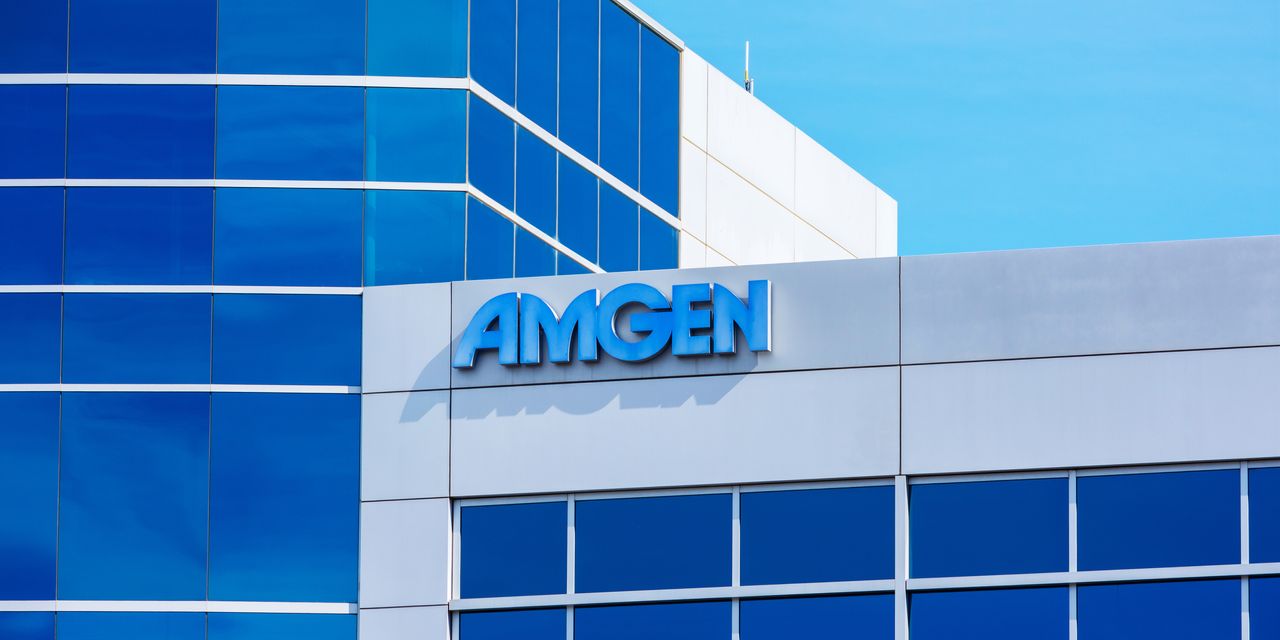The Federal Trade Commission on Tuesday sued to block
Amgen
‘s $27.8 billion acquisition of
Horizon Therapeutics,
laying out a rationale that, if upheld by federal courts, could broadly undermine the biotechnology ecosystem.
Amgen
(ticker: AMGN) and
Horizon
(HZNP) do not sell competing medications; they have none of the portfolio overlap that is often a concern in pharmaceutical mergers.
Instead, the FTC said it alleged that Amgen, a large biopharma company, could use the negotiating power of the rest of its portfolio to lock in the monopoly positions of two high-priced Horizon drugs, Tepezza and Krystexxa, which treat thyroid eye disease and chronic refractory gout, respectively.
“The value of the rebates that Amgen can offer on its high-volume drugs as part of its cross-market bundles may make it difficult, if not impossible, for smaller rivals who are developing drugs to compete against Tepezza and Krystexxa to match the level of rebates that Amgen would be able to offer,” the FTC said in a statement.
That argument, if it stands, could be used to block many acquisitions of smaller biotechs with a novel product on the market. That would be highly disruptive to the biotech ecosystem, which is predicated on the expectation that successful biotechs get acquired by large-cap biopharmas.
“If allowed to stand, we think this new approach is likely to cast a lasting pall over the sector for some time to come,”
Piper Sandler
analyst Christopher Raymond wrote in a note early on Tuesday, following reports that the FTC planned to file the lawsuit but before the agency announced it had actually filed.
The
SPDR S&P Biotech
exchange-traded fund (XBI), which tracks the biotech sector, was down 3.1% at midday on Tuesday. Horizon shares were down 15%, while Amgen shares were down 1%. Shares of
Seagen
(SGEN), a cancer-focused biotech whose $43 billion acquisition by
Pfizer
(PFE) is pending, were down 5%.
In a statement, Amgen said it was “disappointed” by the FTC lawsuit, and said it hoped to close the deal by mid-December.
“The FTC’s claim that Amgen might ‘bundle’ these medicines (offer a multi-product discount) at some point in the future is entirely speculative,” Amgen said in its statement. It also said that it had “committed” not to bundle the specific Horizon products that the FTC had pointed to as problematic.
Amgen said it wasn’t aware of any prior deal that had been blocked under the same theory.
In a separate statement, Horizon said that it “does not and has no plans to bundle any of its rare disease medicines,” and that the complaint “is rooted in a theory about potential future ‘bundled’ contracts with payors and not competitive overlap concerns.”
The FTC’s focus on bundling ties in to ongoing debates over the role of pharmacy-benefit managers, the entities that negotiate with drugmakers on behalf of insurers. Drugmakers cut deals with the pharmacy-benefit managers, or PBMs, to get their drugs on the lists of medications for which patients are eligible, known as formularies. In order to do so, they often pay significant rebates back to the PBMs.
Larger drugmakers can use their ability to pay big rebates to secure formulary placement for smaller drugs in their lineups. In its statement, the FTC said that the Amgen lawsuit is tied to its continuing work on PBMs.
The FTC suit comes amid a wave of aggressive enforcement actions by the agency, including its order in April that the gene sequencing company
Illumina
(ILMN) divest the early detection cancer company Grail, and its efforts to block
Microsoft
‘s (MSFT) acquisition of videogame maker
Activision Blizzard
(ATVI).
Amid the broader antitrust push, FTC Chair Lina Khan has signaled a particular focus on pharmaceutical mergers. “The pharmaceutical sector is where the life-and-death stakes of our work as antitrust enforcers really comes to the fore,” Khan said at an FTC event on pharmaceutical mergers last year. “Reports on the state of competition in the pharmaceutical markets in recent years have been troubling and underscored just how much work there is to be done.”
In notes early Tuesday, before the case was actually announced, analysts suggested that the FTC suit may not be successful. “This case looks weak,” Jefferies analyst Akash Tewari wrote.
Investors will now debate just how bearish the FTC’s lawsuit is for biotech. If the agency is able to block the Horizon deal, will Big Pharma firms be forced to seek earlier-stage deals? What does it mean for biotechs with products on the market right now? “Even the most optimistic VC or financial sponsor has to now factor this into their investment calculus going forward,” Piper Sandler’s Raymond wrote.
Write to Josh Nathan-Kazis at [email protected] and Callum Keown at [email protected]
Read the full article here





